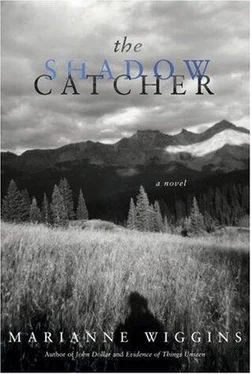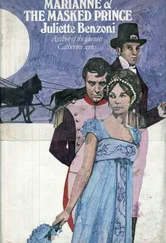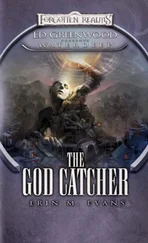“That day you were in the tub,” he said.
She angled her head more elegantly so she could look him in the eye. The lantern highlighted her hair, a burnished corona.
“Why did you stand up?”
She stared at him.
“So you would look at me. So you would see me.”
“—see you…how?”
“The way I am.”
He put down the viewing frame and studied her.
“Show me,” he instructed.
Moving carefully, almost afraid to fall, fearful of disturbing what she intuited was a fatal balance, she stood, walked several paces toward the wall so he could see the full length of her body, turned to face him and slipped off her remaining underclothes.
“Turn around,” he told her.
She turned her back to him.
“Lift up your hair,” he said.
She raised her hair with one arm and stood waiting, facing away from him, facing the wall, facing into that non-participatory space that figures turned away in pictures face.
“Don’t move,” he said.
She stood for him, staring forward at the wall, until his silence started to feel strange and his unseen gaze on her created not a shared experience but a partition. She began to want to look back, to meet his eyes, to play an active, not a passive, part in what he saw, so she glanced over her shoulder and saw that he had framed her body in the viewing frame. She stood regarding him and in the shadow of the lantern on his face saw for the first time a different sort of animation rising in his eyes. “Come here,” he said, and as she moved to him she became aware of something in his body, in the way he held himself. When she climbed beneath the sheets she saw his excited sex, a third party in the bed.
“Show me how to do this,” he asked her.
“Edward, I don’t know—”
“You know everything,” he said.
Her instinct was to kiss him, press her breasts against his chest and press her body to him, but when she tilted her face to meet his lips he rolled her over, rolled her to her side, her back once more to him and then he pushed her top leg forward and she felt his sex pushing at her, felt him fumble himself forward through the narrow place between her thighs and then she felt the pain of his insertion. She made a small knob of the sheet inside her fist and bit down on it as he pressed forward, deeper, into her. He began to rock against her as she closed her eyes and then in a juttering spasm he fell still, his ragged breath against her back. She had thought that love would be an open confrontation, face to face, that love would be between the eyes, not like this, the way two animals would do it. She didn’t speak, although she wanted to, she didn’t move, she merely breathed and waited for some gentle sign from him. After a while she felt that part of him that was inside her diminish, then she felt a bath of liquid on her legs and Edward rolled from her onto his back. She raised herself onto her elbows and looked at him. His arm was crooked across his forehead, casting his eyes in shadow, hiding them from her. She said his name. “Sleep,” he told her, and she put the lantern out.
She thought she heard him rise while it was still dark and she thought she’d said his name again and that he’d told her to go back to sleep again, but she may have only dreamed it. When she woke gray light filtered through the only window, shadowing the outlines of the pictures on the walls and at the instant that she started to remember where she was and what had happened she knew at once that he was gone. She sat up and listened. There was no sign of him. His walking stick was nowhere in the room.
She stood up and was immediately leveled to her knees by pain, clutching at the bed for balance. Somewhere deep inside her pelvis was a thorn that made it hard to stand and as she knelt, trying to overcome it, she saw that she had bled across the sheet during the night. Her thighs were caked with blood and as she rose she reached for her black poplin skirt to dress in and to hide her stain. Over the skirt she pulled her shift and then she walked, one stiff step at a time, to the door.
He was not in the kitchen.
Nor was he in the yard.
She hesitated briefly, deciding whether to draw water to make coffee for their breakfast or to go and find him in the barn.
But his room was empty. His knapsack was not there. Neither was the camera in the other room and in the barn a single stall door stood ajar where the mule had been set free. Through the fresh ash on the ground outside the barn she could see the mule’s tracks leading toward the yard, a line of round depressions from the walking stick beside them. She followed their trace down the rutted track until it met the road. One direction led to the sawmill and the other to the inner coastline and the ferry and she stood and watched the tracks turn sharply toward the route to water where they disappeared to a single vanishing point in the distance. However far away the two edges of the road might seem to converge into the illusion of disappearance, Edward was beyond that point by now, she knew, outside the picture. How far could he go in his condition? He could not walk far — for a day, she told herself — perhaps only for the morning — so her best mode of conduct would be to carry on, prepare for his return as if nothing out of the ordinary had transpired. Except that something out of the ordinary had transpired and she was both confused and disappointed by it and ashamed of her compliance. If he had kissed her, if he had said good-bye, if he had ever said her name — she started turning over if s as she sat at the kitchen table, waiting. In a rash of energy she stripped the bed and washed herself despite the pain from a basin of cold water and dressed herself to follow in his tracks but then had second thoughts. What would she say to him? He had left her on the morning after what was reputed to be love, reputed to be sacred between a married couple, between a husband and a wife.
She sat through the dwindling light and lit only a single lantern turned down low when she realized it had grown too dark to see her hands. At the moonrise she brought blankets and a pillow to the porch and made a basic pallet on the boards, but didn’t sleep. The moon, gibbous, was the color of her blood.
Northwest Pacific moisture woke her at the dawn, the damp seeping in to chill her bones and she rose, her limbs and back as stiff as corn husks, and began to feel a low-burning anger tempering her mind and body, firing her action. She went through the day accomplishing the chores, rearranging the position of the bed in the bedroom so that it appeared restored or reinvented and no longer reminded her of what had taken place there. Still, after a bleak supper of cold potatoes standing at the window in the kitchen, looking out, when she had tried to retire to the bedroom for the night she found no comfort in the bed that had been bought for one generation of Curtis men and had accommodated another generation of them — where one had died and another had failed to live up to her expectations — and she passed a second night outside on the porch.
When she woke she knew her time within the Curtis family was nearing its completion. She sat up, looked at the new day, hugged her knees to her chest and looked at the ragged compound and its moldering barn and told herself, as Edward must have told himself the morning he had left her, I need to be quit of here . Even when, or if, Edward returned what future was there here, for them, for her, with the old woman and her pallid daughter in the room next door, the endless chores, the evaporating dreams of his and hers from week to week? But then she remembered moments when her heart had thrilled at what he’d said, the way he’d looked, his courage and his photographs. When he comes back, she started to rehearse, and if he tells me why he left and if he tells me he is sorry to have gone with no parting word or explanation, then…
Читать дальше











